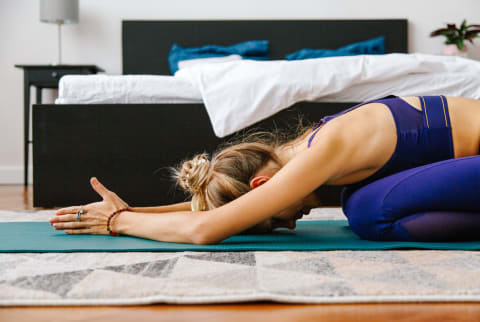Advertisement
5 Healthy Habits MDs Say We Should Start In Quarantine


Over the last 79 days, team mbg has been out of the office (but who's counting?); we've asked tons of doctors about how to stay healthy during a pandemic. And while they all bring their own perspective to the table, there are a few common themes that keep coming up.
Here are five things that health care professionals of all stripes recommend doing for your physical and mental health during this time. Making them nonnegotiables can add some stability to your everyday routine in the age of so many unknowns:
Go to bed earlier than usual.
Sleep is when our body recovers from the day, and a good night's rest can support immunity. "While our body is resting, the immune system cells can also focus all efforts and energy on a strong attack against viruses and bacteria," immunologist Heather Moday, M.D., wrote in an article on the sleep-immunity connection last month. "Also, sleep enhances the formation of memory antibodies to bacteria and viruses, to help build a stronger immune system for the future." So if there's ever a time to sleep in or go to bed earlier, it's now.
If stress about work, family, or the general state of the world is keeping you up at night, Moday recommends mbg's sleep support+ supplement. Since introducing it to her own routine, she's found that she wakes up less frequently in the middle of the night and wakes up feeling more rested thanks to its combo of magnesium, PharmaGABA, and jujube—all of which can help increase relaxation and promote deeper sleep.*
Meditate (or just pay attention to your breath) for 10 minutes, twice a day.
"Deep belly breathing while meditating stimulates the vagus nerve1 and turns on the parasympathetic, or 'rest-and-digest,' part of our nervous system, which helps to lower heart rate and reduce anxiety in just a matter of minutes," Robin Berzin, M.D., functional medicine physician and the founder of Parsley Health, wrote on mbg this week. She recommends taking 10 minutes every morning and night to reconnect to your body by way of the breath. Think of it as a sedentary mental commute to bookend your day.
Be selective about what makes it onto your plate...
If you're doing more cooking for yourself in quarantine, you're probably already eating healthier than usual, and that's great. Mark Hyman, M.D., a functional medicine doctor, says that this is the gold standard breakdown for what to include in those homemade meals every day to support immune strength:
- 2 servings of fruit
- 8-plus servings of vegetables a day (One serving is half a cup.)
- 1 gram/kg, or about half your body weight in grams of clean protein a day (grass-fed beef, pasture-raised eggs, or wild-caught salmon if you're a meat-eater; legumes, nuts/seeds, and gluten-free tofu and tempeh from non-GMO soy if you're vegan)
- fermented foods
Try to avoid processed sugar, refined starches, and added salt when you can. Thanks to the gut-brain connection, eating nutrient-dense, minimally processed foods could also pay dividends for anxiety levels.
...and onto your phone.
According to holistic psychiatrist Ellen Vora, M.D., this is the time to revisit your boundaries around technology. While we all want up-to-date information about what's going on, there's a fine line between being informed and being overwhelmed. Vora recommends setting limits on how often you check your phone every day and what you do once you're on it: "Notice what makes your breath tighten, and practically set boundaries. Don't cut yourself off from what's going on, but choose carefully where you're getting your information from," she told us on a recent episode of the mbg podcast.
When you do feel yourself getting overwhelmed and triggered by something you read, remember the 90-second rule: Your body's chemical reaction to a stimulus usually lasts for only 90 seconds. After that, it's up to you to decide if you want to continue to respond to it or just move on.
5. Make time for joy.
You can eat all the best foods, take all the right supplements, and exercise all the time—but it won't make you healthy if you're miserable doing it. Doing things for pure pleasure is important always but especially now. Make the cheese board. Drink the cocktail. Watch the trashy movie. And know that day by day, we'll make it through this together.
